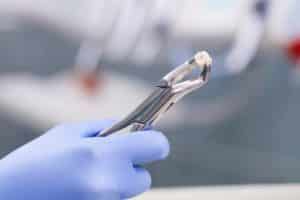 The philosophy of modern dentistry is to maintain and retain as much of your natural healthy teeth, and tooth structure as possible in all cases. Therefore, minimally invasive procedures have been and are continuing to be developed with the goal to save your teeth and as much of your remaining healthy tooth structure when deciding upon treatment. There was a time when pulling your tooth would be the only option, even if you only had a toothache. Of course, that was centuries ago. Today there are a variety of options to keep your teeth healthy and avoid extraction. However, there are still certain reasons when a tooth extraction makes sense.
The philosophy of modern dentistry is to maintain and retain as much of your natural healthy teeth, and tooth structure as possible in all cases. Therefore, minimally invasive procedures have been and are continuing to be developed with the goal to save your teeth and as much of your remaining healthy tooth structure when deciding upon treatment. There was a time when pulling your tooth would be the only option, even if you only had a toothache. Of course, that was centuries ago. Today there are a variety of options to keep your teeth healthy and avoid extraction. However, there are still certain reasons when a tooth extraction makes sense.
Why Choose Extraction?
Although tooth extraction is usually the last choice as a treatment option, there are reasons that removing a tooth becomes required. Those reasons include:
Orthodontic Treatment: To prepare for orthodontic treatment–this usually affects teens or tweens the most–there may be the need to extract one or two normally healthy teeth to make room to gradually reposition the rest of the teeth via braces.
Extensive Damage: If a tooth has experienced extensive damage due to trauma or decay and can no longer be repaired, extraction would be the treatment of choice. One example would be if a tooth cracked or broke down to the root beneath the gumline.
Disease: If tooth decay moves past the hard structures of the tooth–the enamel and dentin–and into the soft living tissue–the pulp–not only can this cause extreme pain, but this infection can travel into your gingival tissues and jawbone, and possibly to other areas of your body. If the infection cannot be eliminated with antibiotics and the tooth restored via a root canal, extraction is the only option, especially for those whose health is already compromised, and for which infection can be dangerous.
Periodontal disease and/or jawbone atrophy: People suffering from periodontal disease can experience loose teeth due to the breakdown of the periodontal ligaments that hold the teeth in place, or because the disease has adversely affected the jawbone making it too weak to support the teeth.




Recent Comments